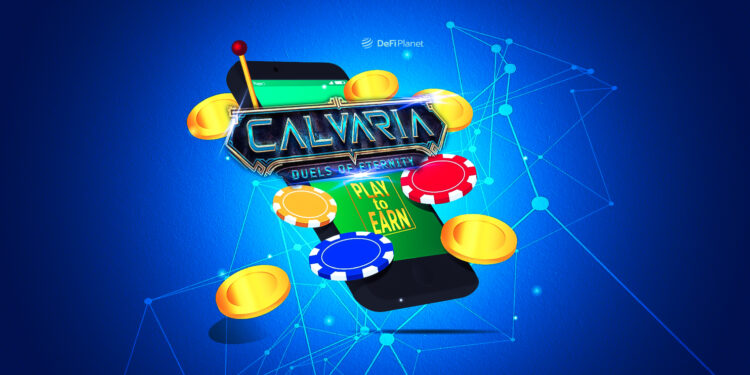Calvaria is a digital trading card game that is fast gaining traction in Web3 gaming. Calvaria players are immersed in a metaverse where they can choose from various non-fungible token (NFT) trading cards representing different characters, putting an interesting spin on play-to-earn (P2E) as we know it.
Calvaria’s token presale in February 2023 caused quite a stir, with many fans and gaming enthusiasts drawn to the game’s exciting features and competitive prices. According to the project’s roadmap, the game is currently in beta mode and will be launched for public access in the second half of 2024.
How Does Calvaria Work?
Calvaria: Duels of Eternity transports players to an afterlife inspired by Mexican mythology, where the factions of Santa Muerte, Quetzalcoatl, and the Void wage an eternal war. At its core, it’s a strategic card game, albeit underpinned by blockchain technology.
Calvaria offers a gameplay experience that revolves around the strategic building of decks. Each deck is composed of NFT cards, each representing a unique character with distinct abilities and stats. Players strategically deploy these units across the battlefield, combining their skills to outmaneuver opponents in the best-of-three rounds that make up each tournament duel.
The cards themselves are non-fungible tokens minted on the Polygon network. Polygon, a scaling solution for Ethereum, ensures fast, affordable transactions. The use of blockchain technology in Calvaria is not just a feature, but a fundamental aspect that enables true ownership of in-game assets by the players.
The cards players collect, purchase, and upgrade are their own private property on the blockchain. They can freely trade them on NFT marketplaces like any other digital collectible. Calvaria’s tokenomics incentivizes sustained ownership (HODLing) of the NFT cards.
Calvaria’s economy and tokenomics are based on its native token, $RIA, an ERC-20 token with supply capped at 1 billion. Players earn $RIA by winning duels, which can be used to purchase booster packs, upgrades, and other items from the in-game store. A percentage of all store sales is directed to a staking pool, allowing $RIA holders to earn passive rewards for helping secure the ecosystem.
The Calvaria ecosystem also has a secondary token, eRIA. This token is primarily used for in-game activities, such as shopping and card upgrades. Players are rewarded with eRIA for their time spent in the game environment.

Calvaria offers a variety of game modes to accommodate different play styles. Beginners can hone their skills through single-player campaigns before challenging others one-on-one or in larger competitions where top prizes await. The game is accessible worldwide across devices with no special equipment required.
The game has two modes: free-to-play and play-to-earn. In the free-to-play mode, you can enjoy the game without earning any tokens. In the play-to-earn mode, you can earn $RIA by winning battles and then use those tokens to buy more NFT trading cards, which can help you win more battles. These tokens unlock the ability to cash out or reinvest into NFT card upgrades for better decks. Additional economic upside comes from advertisements, royalties, scholarships, and more.
Calvaria’s onboarding is pretty straightforward; unlike most Web3 games, a crypto wallet is not required to start playing. Players from around the world can play and earn rewards through skills. However, they eventually require wallets to store their prizes.
The game ecosystem is designed to gradually transition to a decentralized autonomous organization (DAO) where $RIA stakers govern its future development. Looking ahead, expansions through NFT sales, mobile apps, and large esports tournaments with lucrative $RIA prize pools aim to create an economy that straddles gaming and investing.
How is Calvaria Different from Other Web3 Games
Calvaria’s game design has no artificial barriers preventing players from having fun or even playing. You don’t need a crypto wallet to hold crypto or to buy any assets to start playing. It also differs from other crypto games in that it can be played without prior crypto knowledge, nor do you need any special skills or equipment to play it. Its friendly user interface makes it easy to participate in the gaming ecosystem, whether you’re new to crypto or a pro.
The game is accessible to players all over the world, regardless of their device or location. Calvaria currently has a desktop version, but efforts are underway to release a mobile version for iOS and Android.
Most P2E games are simply NFT-based games, and rarely provide more than that. Calvaria, conversely, includes a story mode and a variety of game modes to accommodate players with different goals and preferences.
Players can easily test and improve their skills through single-player campaigns, one-on-one challenges, and larger competitions. It also has a staking feature, mini-games, a scholarship system, and an in-game store. This allows players to earn money in various ways without having to resort to Player vs. Player combat.
The Calvaria team has stated that its top priority is creating a game with the highest community input, intending to extensively use the ecosystem’s decentralized nature. This means that the project will eventually transition to being managed by a Decentralized Autonomous Organization (DAO).
Potential Hurdles to Calvaria’s Success
While Calvaria presents an ambitious vision for blending strategic gameplay with true digital ownership and a play-to-earn economy, there are some potential hurdles that could impact the project’s ability to realize its full potential. These include:
Sustainability of the Play-to-Earn Model
As with many P2E games, Calvaria’s long-term sustainability and ability to maintain a healthy economy depend on continuous player growth and retention. Insuffient influx of new users or a loss of interest over time by existing players, could lead to an imbalance in the tokenomics and devaluation of in-game assets/currencies.
To address this, Calvaria has plans for continuous game expansions, new modes, collectible NFT releases, large prize pool tournaments, and an eventual transition to a community-governed DAO model. This roadmap aims to keep the game fresh and keep players engaged. Additionally, its free-to-play option serves as an onramp to drive new adoption into the P2E ecosystem.
Regulatory Uncertainty
The legal and regulatory landscape surrounding blockchain-based games and their in-game economies is still evolving across different jurisdictions, creating potential roadblocks. There are risks around how authorities may view tradable crypto tokens earned in-game or NFT assets in the future.
Calvaria, according to its whitepaper, is taking a cautious approach by not promoting the $RIA token as a security or investment product. However, any future regulatory crackdowns could impact the game’s design or operations.
Competition in the Web3 Gaming Space
While still relatively nascent, Web3 gaming is seeing increasing entrants offering blockchain-based trading card game experiences similar to Calvaria. Calvaria is looking to differentiate itself through innovative NFT collection releases providing in-game benefits, and an extensive gameplay roadmap including expansions, mobile apps, esports ambitions and a decentralized future. Competitors with superior gameplay, economical designs, and marketing could make it difficult for the project to attract and retain a sizable user base.
Final Thoughts
While P2E games, at the onset, enjoyed their fair share of popularity, lack of innovation and sustainability has led to waning interest in recent years. Calvaria aims to revitalize the P2E market by offering a multifaceted experience – combining engaging gameplay across multiple modes with meaningful economic incentives and true digital ownership.
As the project continues to develop and expand its user base, its success will depend on its ability to deliver a compelling and sustainable gaming experience while navigating the evolving regulatory landscape surrounding blockchain-based games and their in-game economies.
Calvaria represents a unique vision for bridging the divide between traditional gaming and crypto which if well executed, could unlock the next era of Web3 gaming.
Disclaimer: This article is intended solely for informational purposes only and should not be considered trading or investment advice. Nothing herein should be construed as financial, legal, or tax advice. Trading or investing in cryptocurrencies carries a considerable risk of financial loss. Always conduct due diligence.
If you would like to read more articles like this, visit DeFi Planet and follow us on Twitter, LinkedIn, Facebook, and Instagram, and CoinMarketCap Community.
“Take control of your crypto portfolio with MARKETS PRO, DeFi Planet’s suite of analytics tools.”





















